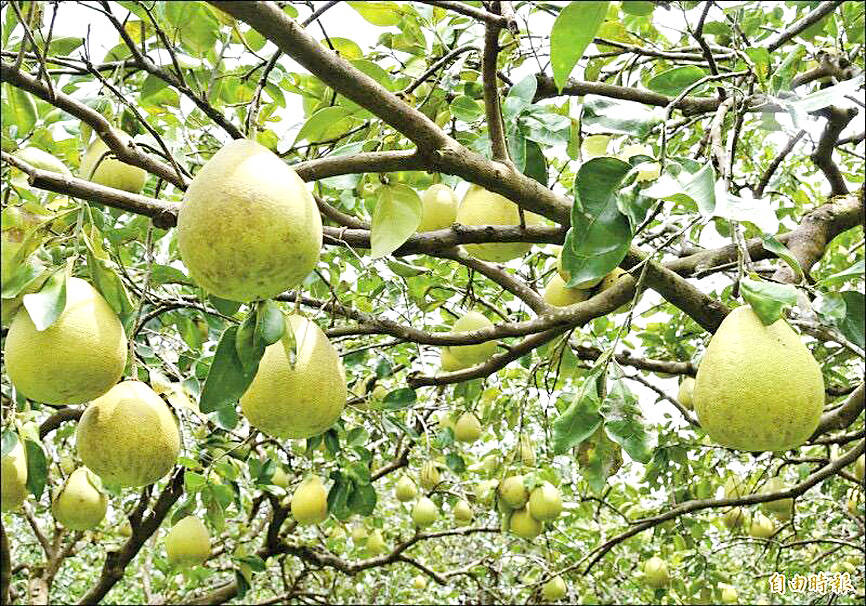Beijing’s decision to lift pomelo import restrictions for Hualien County, but not elsewhere, was a “zero-cost united-front tactic,” a government official said yesterday.
Earlier this month, China approved pomelo imports from 16 orchards and 19 packaging plants based in Hualien — which is governed by the Chinese Nationalist Party (KMT) — but none for Democratic Progressive Party (DPP)-governed Tainan, where pomelos are also grown, following an initial announcement that it would remove the ban entirely, Chinese-language media reported.
China in August 2022 halted imports of Taiwanese citrus fruits, including pomelos, citing failed sanitation inspections.

Photo: Taipei Times
DPP Legislator Kuo Kuo-wen (郭國文), whose constituency includes Tainan’s fruit-growing Madou District (麻豆), said that this year’s Mid-Autumn Festival “smelled like pomelo and moon cakes, but reeked of politics.”
Pomelo are traditionally eaten during the festival.
Beijing’s “one pomelo, two systems” policy is intended to sow division among Taiwanese growers, Kuo said, adding that the move proved the Chinese government’s “united-front work tactics are becoming cheap.”
Separately, an official with knowledge of the matter said that China timed the policy change to coincide with the festival for maximum political effect.
Beijing’s tactic is to play savior by causing a problem before extending a benefit to solve it, often with the help of local collaborators, such as the orchard owners and packaging plants profiting from the ban’s partial lifting, said the official, who declined to provide his name.
“This is a zero-cost united-front tactic,” the official said, adding that the purpose is to favor KMT-governed regions.
The differential treatment of Taiwan’s administrative regions is unreasonable, but confuses the public — as most Taiwanese are not familiar with the sequence of events — and tricks victimized growers into gratitude toward Beijing, he said.
KMT local government heads and elected representatives who made a show of agreeing with Beijing’s “one China” principle and the so-called “1992 consensus” in exchange for perks are contributing to the plight of the nation’s agricultural sector, he said.
The “1992 consensus,” a term that former Mainland Affairs Council chairman Su Chi (蘇起) in 2006 admitted making up in 2000, refers to a tacit understanding between the KMT and the Chinese Communist Party (CCP) that both sides of the Taiwan Strait acknowledge there is “one China,” with each side having its own interpretation of what “China” means.
KMT caucus whip Fu Kun-chi’s (傅?萁) meeting in April with CCP Politburo Standing Committee member Wang Huning (王滬寧) exemplifies China’s use of “united front” tactics, National Cheng Kung University professor of political science Hung Chin-fu (洪敬富) said.
Fu served as Hualien County commissioner from 2009 to 2018.
By inducing local governments to agree with China to sell fruit, Beijing uses economic power as a political weapon to compromise Taiwan’s national sovereignty and turn urban areas against rural areas, he said.
Cooperating with Beijing’s strategy would erode trust in the government and foster dependency on China, which would ultimately be harmful to Taiwan’s economy and democracy, Hung said.

Chinese Nationalist Party (KMT) Chairman Eric Chu (朱立倫), spokeswoman Yang Chih-yu (楊智伃) and Legislator Hsieh Lung-chieh (謝龍介) would be summoned by police for questioning for leading an illegal assembly on Thursday evening last week, Minister of the Interior Liu Shyh-fang (劉世芳) said today. The three KMT officials led an assembly outside the Taipei City Prosecutors’ Office, a restricted area where public assembly is not allowed, protesting the questioning of several KMT staff and searches of KMT headquarters and offices in a recall petition forgery case. Chu, Yang and Hsieh are all suspected of contravening the Assembly and Parade Act (集會遊行法) by holding

PRAISE: Japanese visitor Takashi Kubota said the Taiwanese temple architecture images showcased in the AI Art Gallery were the most impressive displays he saw Taiwan does not have an official pavilion at the World Expo in Osaka, Japan, because of its diplomatic predicament, but the government-backed Tech World pavilion is drawing interest with its unique recreations of works by Taiwanese artists. The pavilion features an artificial intelligence (AI)-based art gallery showcasing works of famous Taiwanese artists from the Japanese colonial period using innovative technologies. Among its main simulated displays are Eastern gouache paintings by Chen Chin (陳進), Lin Yu-shan (林玉山) and Kuo Hsueh-hu (郭雪湖), who were the three young Taiwanese painters selected for the East Asian Painting exhibition in 1927. Gouache is a water-based

Taiwan would welcome the return of Honduras as a diplomatic ally if its next president decides to make such a move, Minister of Foreign Affairs Lin Chia-lung (林佳龍) said yesterday. “Of course, we would welcome Honduras if they want to restore diplomatic ties with Taiwan after their elections,” Lin said at a meeting of the legislature’s Foreign Affairs and National Defense Committee, when asked to comment on statements made by two of the three Honduran presidential candidates during the presidential campaign in the Central American country. Taiwan is paying close attention to the region as a whole in the wake of a

OFF-TARGET: More than 30,000 participants were expected to take part in the Games next month, but only 6,550 foreign and 19,400 Taiwanese athletes have registered Taipei city councilors yesterday blasted the organizers of next month’s World Masters Games over sudden timetable and venue changes, which they said have caused thousands of participants to back out of the international sporting event, among other organizational issues. They also cited visa delays and political interference by China as reasons many foreign athletes are requesting refunds for the event, to be held from May 17 to 30. Jointly organized by the Taipei and New Taipei City governments, the games have been rocked by numerous controversies since preparations began in 2020. Taipei City Councilor Lin Yen-feng (林延鳳) said yesterday that new measures by